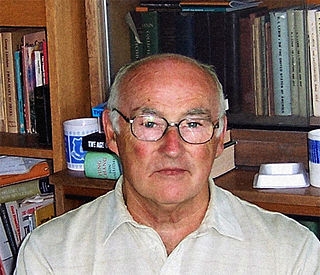The term large-group awareness training (LGAT) refers to activities—usually offered by groups with links to the human potential movement—which claim to increase self-awareness and to bring about desirable transformations in individuals' personal lives. LGATs are unconventional; they often take place over several days, and may compromise participants' mental wellbeing.

Eileen Vartan Barker is a professor in sociology, an emeritus member of the London School of Economics (LSE), and a consultant to that institution's Centre for the Study of Human Rights. She is the chairperson and founder of the Information Network Focus on Religious Movements (INFORM) and has written studies about cults and new religious movements.

Lyndon Hermyle LaRouche Jr. was an American political activist who founded the LaRouche movement and its main organization, the National Caucus of Labor Committees (NCLC). He was a prominent conspiracy theorist and perennial presidential candidate. He began in far-left politics in the 1940s and later supported the civil rights movement, but in the 1970s he moved to the far-right. His movement is sometimes described as, or likened to, a cult. Convicted of fraud, he served five years in prison from 1989 to 1994.

Peter Taaffe is a British Marxist Trotskyist political activist and former leader of the Socialist Party.
The National Caucus of Labor Committees (NCLC) is a political organization in the United States founded and controlled by political activist Lyndon LaRouche until his 2019 death. LaRouche sometimes described the NCLC as a "philosophical association". It is the main organization within the LaRouche movement. LaRouche was the association's leader, and the political views of the NCLC are virtually indistinguishable from those of LaRouche.
Timothy Andrew Wohlforth, was a United States Trotskyist leader. On leaving the Trotskyist movement he became a writer of crime fiction and of politically oriented non-fiction.
Cult is a lay term for a group perceived as requiring unwavering devotion to a set of beliefs and practices which are considered deviant outside the norms of society. Such groups are typically perceived as being led by a charismatic leader who tightly controls its members. It is in some contexts a pejorative term, also used for new religious movements and other social groups which are defined by their unusual religious, spiritual, or philosophical beliefs and rituals, or their common interest in a particular person, object, or goal. This sense of the term is weakly defined – having divergent definitions both in popular culture and academia – and has also been an ongoing source of contention among scholars across several fields of study.
The Socialist Labour Group was a Trotskyist group in Britain between 1979 and 1989.

Captive Hearts, Captive Minds: Freedom and Recovery from Cults and Other Abusive Relationships is a study of cults and abusive relationships by Madeleine Landau Tobias, Janja Lalich, and Michael Langone. It was published by Hunter House Publishers in 1994. In 2006, the book was reissued as Take Back Your Life: Recovering from Cults and Abusive Relationships.

Bounded Choice: True Believers and Charismatic Cults is a 2004 psychology and sociology book on cults by Janja Lalich. It was published by University of California Press.
Janja Lalich is an American sociologist and writer. Lalich is an expert on cults and coercion, charismatic authority, power relations, ideology and social control. She is a professor emerita of sociology at the California State University, Chico.
Clouds Blur the Rainbow: The Other Side of New Alliance Party is a non-fiction report by Chip Berlet, published in 1987 by Political Research Associates (PRA). Berlet presents his view that Lenora Fulani and her campaign manager and tactician Fred Newman "use totalitarian deception to manipulate social and political activists, and describe Newman and Fulani's therapeutic approach, Social Therapy, as "totalitarian cultism".
On the Edge may refer to:
The Democratic Workers Party was a United States Marxist–Leninist party based in California headed by former professor Marlene Dixon, lasting from 1974–1987. One member, Janja Lalich, later became a widely cited researcher on cults. Lalich characterized the DWP as a political cult with Dixon serving as its charismatic leader. She estimated that the Democratic Workers Party at one point had 125-150 full-time members and 300-1,000 members with various degrees of affiliation.
Under a variety of names and within a number of organizations over at least 17 years, the group around Harry Turner, or Turnerites was a presence within Trotskyism in the United States.
The Revolutionary Tendency within the American Socialist Workers Party was an internal faction that disagreed with the direction the leadership was taking the party on several important issues. Many groups and movements would have their roots in the RT, both in the United States and internationally, including the Socialist Equality Party and the world Spartacist and LaRouche movements and their various splinters.
The International Committee of the Fourth International (ICFI) is a public faction of the Fourth International founded in 1953. Today, two Trotskyist internationals claim to be the continuations of the ICFI; one with sections named Socialist Equality Party which publishes the World Socialist Web Site, and another linked to the Workers Revolutionary Party in the UK.

Thomas Gerard Healy was an Irish-born British political activist, a co-founder of the International Committee of the Fourth International and the leader of the Socialist Labour League and later the Workers Revolutionary Party.

Edward Grant was a South African Trotskyist who spent most of his adult life in Britain. He was a founding member of the group Militant and later Socialist Appeal.
Michael Banda, born Michael Alexander Van Der Poorten, was a Sri Lankan communist activist best known as the General Secretary of the British Workers Revolutionary Party.







